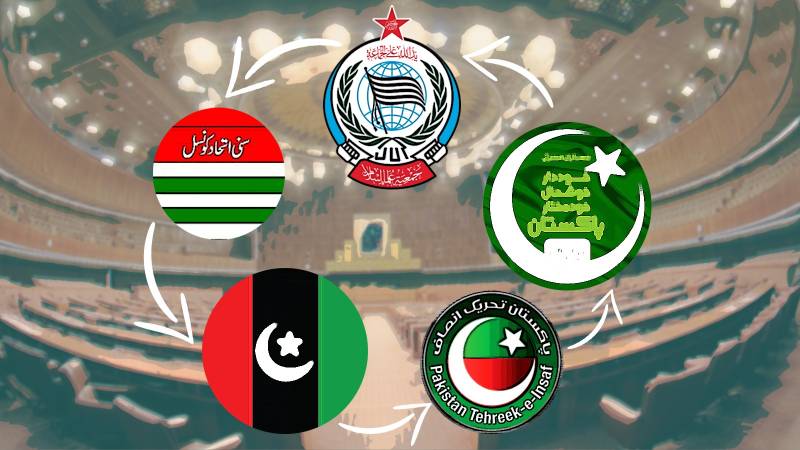
With a cloud still hovering over the February 8 elections and their results, those declared as elected will be heading to the Parliament later this month to form a new government for the next five years. But they do so with a few loose ends remaining.
President Arif Alvi is expected to formally summon the maiden session of the new national assembly before February 29.
Section 91(2) of the Constitution states that the President must convene a session of the National Assembly within 21 days of the official announcement of election results or issuance of its notification.
"The National Assembly shall meet on the twenty-first day following the day on which a general election to the assembly is held, unless sooner summoned by the president," the section says.
According to the rules and procedures, the session will see the outgoing speaker of the National Assembly induct the newly elected lawmakers by administering the oath. Then, as the first order of business, the house will elect a new assembly speaker.
The new speaker will then hold elections for a leader of the house or the prime minister.
The Pakistan Muslim League-Nawaz (PML-N), which secured some 75 seats in the February 8 elections and has since wooed some independents over to its side, is set to take pole position in the 336-member National Assembly.
The prime minister must win a simple majority or gain 169 votes out of 336. Of the 336 seats, 60 are reserved for women and ten for Non-Muslims.
The PML-N has secured the support of the Pakistan Peoples Party (PPP), which should give it sufficient numbers to elect the consensus candidate, Shehbaz Sharif, for a second term as Prime Minister and as Leader of the House.
The PML-N has also won the support of other parties, including the Muttahida Qaumi Movement-Pakistan (MQM-P), the Jamiat Ulema-e-Islam Fazl (JUI-F) - despite earlier differences of opinion, Baloch National Party (BNP) and some others, senior politicians shared with [The Friday Times].
Independent candidates backed by the Pakistan Tehreek-e-Insaf (PTI) will also field a candidate for the leader of the house in the national assembly. The PTI has named Omer Ayub as its candidate to become the house's next leader.
According to the rules and procedures of the national assembly, there can be multiple candidates for the post of prime minister. But if no candidate can secure a majority in the first round, a second round of run-off voting is held between the top two candidates. Voting will continue until one person can secure a majority.
Since most PTI-backed independent MNAs have joined the Sunni Ittehad Council (SIC) — legally and constitutionally- the opposition leader will have to be from the SIC. The PTI also enjoys support from the Majlis Wahadatul Muslimeen (MWM).
Deals and loose ends
In exchange for its support, the PML-N has agreed to back PPP Co-Chairman Asif Ali Zardari for the presidential slot.
The PPP, whose support will be critical to form government in the centre, has decided to stay out of government for the meantime. The party has stated it will not take up any cabinet positions immediately. Rather, it will vie for other constitutional and administrative positions, such as the Senate Chairman and governors in at least two provinces.
Its deal with the PML-N extends into the provincial assemblies of Punjab and Balochistan as well, where the two parties will back each other to form governments. The PML-N will be able to appoint a chief minister of their choice in Punjab, while the PPP will be able to appoint a chief minister of their choice in Balochistan.
Sources say the PPP could join the federal cabinet a few months into the new government's tenure.
The third largest party in the house, the MQM-P, is likely to feature in the new cabinet from the first day. The party is eyeing three key ministries, including the Ministry of Ports and Shipping, the Ministry of Science and Technology and the Ministry of Overseas Pakistanis.
The PML-N is still working out who the other members of the new federal cabinet will be and the size of the cabinet.
The rest of the allies are expected to finalise their deals for a spot in the cabinet or other government positions and appointments before the assembly session begins. The JUI-F could be allotted to the Ministry of Religious Affairs or Communication.
Parliamentary roles
According to the Charter of Democracy, the Chairman of the Public Accounts Committee (PAC) will be from the opposition, but this matter has yet to be decided.
The next important matter will be the formation of various standing committees of the National Assembly and their chairmen. According to political pundits, appointments to these parliamentary positions have always been a minefield.
Reserved seats
All the political parties have submitted their priority list to the Election Commission of Pakistan (ECP).
The reserved seats will be proportionately divided among the elected parties in the respective national and provincial assemblies. They cannot be reserved and later awarded to a political party.
Since PTI is not registered with its iconic Bat symbol, its members have joined SIC to get reserved seats.
Political and constitution experts predict that the upcoming national assembly will witness substantial criticism from the opposition over the conduct of the February 8 polls. Moreover, the exercise of lawmaking will be marred by vociferous protests due to strong opposition.

